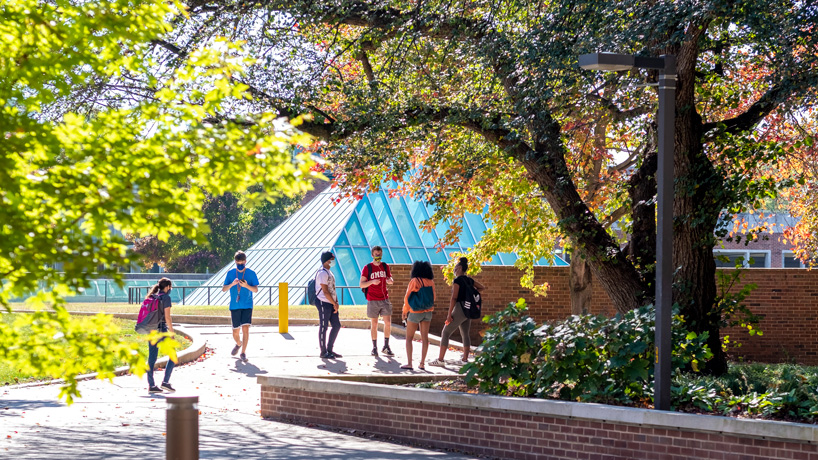
Beginning in the Fall 2021 semester, UMSL students will be able to pursue a Bachelor of Arts in Applied Psychology of Child Advocacy Studies. The Missouri Department of Higher Education and Workforce Development approved the new degree program. (Photo by August Jennewein)
The University of Missouri–St. Louis is continuing to expand degree offerings to leverage the expertise of its faculty and to meet the needs of an evolving workforce.
The Missouri Department of Higher Education and Workforce Development approved UMSL’s plan to add a Bachelor of Arts in Applied Psychology of Child Advocacy Studies Thursday. Students can begin enrolling in the program for the Fall 2021 semester.
“UMSL has been at the forefront of the child advocacy field for years with the Kathy J. Weinman Child Advocacy Center and the research and dedication of faculty and staff in our Department of Psychological Sciences,” UMSL Provost Marie Mora said. “Children are our most valuable resource, yet they are also a vulnerable population. This new and innovative degree program shows our commitment to providing hands-on training for future child-serving professionals to be better equipped to nurture and protect them, particularly during times of crisis such as the COVID-19 pandemic. UMSL graduates from this program – which will be one of only three programs of its kind in the country – will go on to make a remarkably positive impact on the St. Louis region’s children, and therefore its future.”
The BA in Applied Psychology of Child Advocacy Studies is designed for undergraduate students seeking training to become trauma-informed professionals in child-serving fields such as victim services, child protection, social services, mental health, health care, law enforcement and public policy.
“We are thrilled to have the opportunity to have the AP-CAST degree approved by the University of Missouri Board of Curators and the Missouri Department of Higher Education and Workforce Development,” said Clinical Professor Jerry Dunn, who serves as the executive director of Children’s Advocacy Services of Greater St. Louis. “It will allow us to deepen and expand the foundation we’ve built with our CAST minor and certificate. It means that more professionals will be available to do the difficult but necessary work to help the community protect kids.
“We are so appreciative of the support we have received from university administrators throughout this process. Everyone from the faculty of the Department of Psychological Sciences, to the Dean’s Office of the College of Arts and Sciences, to the Academic Affairs teams on our campus and at the University of Missouri System level have been behind this proposal since the very beginning over a year and a half ago. We couldn’t have done this without them.”
The new degree will be housed in the College of Arts and Sciences as part of the Department of Psychological Sciences but will work closely with Children’s Advocacy Services located on South Campus.
Students will learn about the types and effects of child trauma and how to respond appropriately. They will also learn to advocate for the best interest of children, build relationships with children and families and work cooperatively with professionals in other child-serving sectors.
The program’s training will be an extension of the existing Child Advocacy Studies certificate and minor program, which employ a set of principles called TIERS, or trauma informed experiential reasoning skills.
TIERS help students develop critical-thinking and decision-making competencies that will be deployed in the field. The skills are taught through exercises and “problem-based learning simulations” that mimic situations they will face in the field.
“One of the things that is unique about AP-CAST is that it sits at the intersection of academia and community service,” Dunn said. “It is a degree with an emphasis on skill building and what makes that possible is the strong core of psychological theories and concepts. We enhance that by integrating principles of trauma-informed care throughout the curriculum.”
Dunn noted that the degree will position UMSL to offer a vital resource to the St. Louis community and beyond. Workers in child-serving fields are often overwhelmed with cases, which can put children at risk for substandard care.
However, the new degree program takes a significant step toward addressing this issue.
“Our goal with AP-CAST is not only to increase capacity, but also, the quality of our child-serving workforce,” Dunn said. “With the skills they learn in the AP-CAST program, our graduates will be able to work smarter and more collaboratively to make the systems involved in children’s lives more efficient and more effective.”
The program will meet national standards developed by the Zero Abuse Project, which were previously incorporated into the certificate and minor curricula. UMSL was one of the first universities to implement these standards and is also unique in that Children’s Advocacy Services – a fully functioning child advocacy center – is part of the campus.
“UMSL was very proactive almost 25 years ago when it made the investment to support the Kathy J. Weinman Child Advocacy Center on South Campus,” Dunn said. “This made UMSL one of only a handful of universities linked with a functioning child advocacy center that provides forensic interviews and counseling services in cases of child abuse and neglect. Through the years, we have leveraged this position to build core competencies that we are now able to offer students in the classroom. Because of the direct service we perform, the CAST faculty truly understand what it takes to be successful and sustainable in the real world.”














